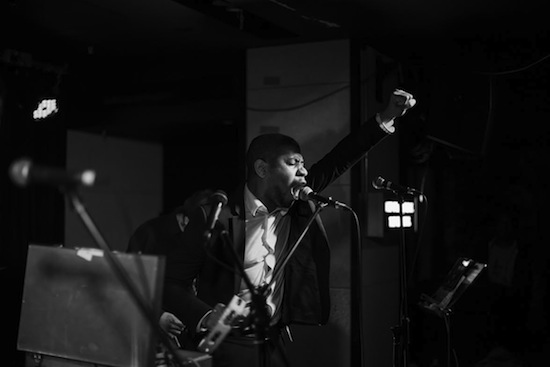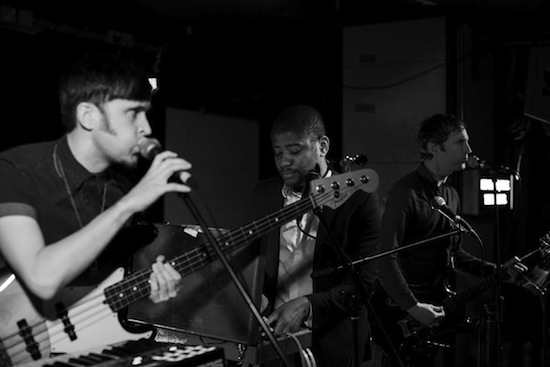Photograph courtesy of Tom Medwell
The Ace Hotel is a funny old venue in which to see Algiers. It’s situated on one of the main roads through Shoreditch, these days a confused neighbourhood of bogglingly expensive bars, restaurants and fancy office space. Just opposite the hotel entrance is a collection of ‘pop-up’ restaurants or, as it seems at first glance, a shanty town of garden sheds resting in an abandoned petrol station. The strip clubs are still here, of course, and the crackheads asking to borrow 50p or flogging lighters for a pound work the pavements just as they did 15 years ago. The Ace Hotel is a a self-aware sort of place (there’s the name for starters) and in the lobby, impossibly attractive people tinker on MacBooks, eking out coffees. Apparently the bedrooms go for 300-plus quid and come outfitted with a vinyl turntable – no records supplied.
Algiers are a group who once would have been encountered in grotty cellar venues, hot spaces suited to their yowling industrial gospel intensity. But of course, most of those places are gone now, and we’re left with the basement venue of this chi-chi hotel, a fairly unremarkable concrete box. Not all bands have to be political, but right now, some ought, and Algiers, who grew up in Atlanta but fled the oppressive confines of the American South for New York and London, are here to testify.
The bell clang and rattling drum machine of ‘Old Girl’ starts to fill the room. Franklin James Fisher’s opening chant sounds hollow and disembodied over the intro track, a call from history. Then he starts bellowing, shrieking, giving it the truth. The guitar, which in most Algiers tracks sounds like a knife scraping across a mirror, could be a lot louder. Yet then the ‘Old Girl’ punches out, the bass and toms suddenly cannoning everything forward. Here we go…
Algiers, on record a trio of Fisher, bassist Ryan Mahan and guitarist Lee Tesche, have tonight added the formidable skills of Matt Tong from Bloc Party at the back of the stage. Combining drums with electronics is always a risk, but it works superbly and, while this is still a band in evolution, they’re heading in the right direction.
It’s exciting to watch a group where all are so absolutely committed to creating a virtuous circle out of acoustic and electronic instrumentation and make it work. It’s part of what makes Algiers so thrilling, to hear Fisher crooning away then fiddling with something to make a weird noise in a leather briefcase on a stand to his right. Algiers are likewise bold in playing ‘Blood’, the best song off their debut, right after ‘Old Girl’. Mahan scans the audience, crosses index fingers in a hex. Tesche stands at the back, pursed lips. Mahan ‘oooos’ and waves his hands in geometric shapes. Fisher twitches hips head in time with the hi-hat snap. "Say your history’s over/ All my blood’s in vain." Let’s hope it isn’t. Then ‘Irony. Utility. Pretext.’, where things get all Teutonic Dystopia; Fisher raises one fist, then two, and stares at the crowd. There’s a hint in his eyes that asks: "Is this the best means of getting our message across, after all?"

What I love about Algiers is they’re one of those sadly rare groups who are here to stimulate soul, heart, sex and intellect. That’s why you can dance to this erotically charged music and review them as Karl Smith did on the Quietus, asking questions about our consumption of art. It’s why the American press coverage of Algiers has seen writers really finding something to identify with in these eloquent, potent songs. Perhaps America, after sticking its head in the sand and hoping for the best for the Bush years, then wahooing along with the false dawn of Obama, is waking up. I can’t work out if Algiers will be able to find a home for their music here in Britain’s current context. Tonight, they’ve a barely controlled aggression that feels more potent, because, right now, this is not necessarily connecting with the wider audience who deserve and should hear this.
So what stands in the way of Algiers? Is Britain, jumping in to a second term of Cameron’s Tories, actually becoming myopic and passive, content – in London at least – to make bland art so long as we’re occasionally allowed inside a lifestyle temple like Ace Hotel? That’s why I put Algiers alongside Fat White Family, (the former the intellectuals, the latter the grotty and proactive shock troops) allied in indignation against a year where the new music on mainstream and pseudo-alternative festival bills frequently consists of anodyne soulful indie and electronic groups from England and Scandinavia; winsome, willowy and white selections of boys and girls, looking like they’ve just stepped out of a Top Shop window. There’s a lot of new music around at the moment that is a co-opting of once-radical ideas, three times bleached, neutered, consumerist, anti-intellectual, passive, dull. In Algiers is everything that pop ought to be: sex, melody, rhythm, grit, death, God or the absence thereof. These are the treasures that frequently seem to be lacking in an increasingly beige age, the critiquing of which is, weirdly, perceived as gauche.
What the future holds for Algiers is as yet unclear, though if success were judged on conviction alone, they’d be doing just fine. Mahan punches his head in time with the beat as guitar shrieks like a stretched pig. The builds on ‘Remains’ and ‘And When You Fall’ are minimal and brittle, the former building on the sonics of Southern American myth, a clank like the oil pump or train. The mood shifts with ‘Games’, the most recognisably ‘gospel’ track played tonight. Fisher sings, eyes shut: "We bury ourselves in our bottles/ We bury ourselves in our Bibles/ And then you come around/ Singing how Rome is burning" and finally silences the room. He stomps on the floor, simple chords are picked. Everyone gets this one, the cornerstone of Algiers’ mission to use gospel as a Trojan horse to bring people into politics and noise. Algiers carry a fire and I hope I will see it blaze. All the best evangelists are misunderstood in their own time, after all.


